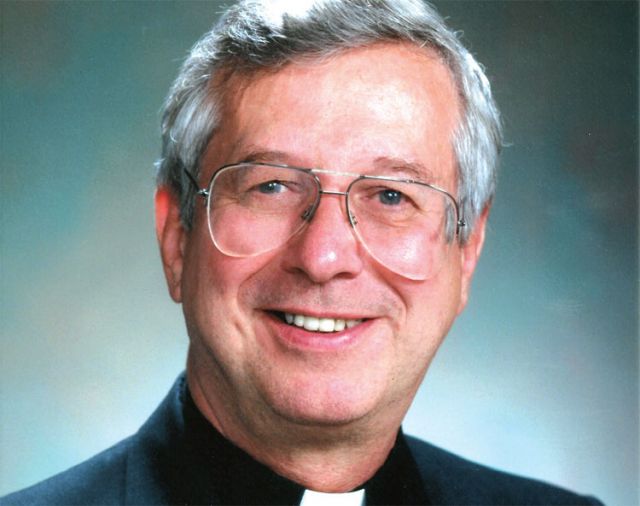We Basilians are unlikely to forget his two dynamic, creative and hopeful terms of leadership of our religious order from 1981- 1989. Men and especially women religious from across Canada will cite his memorable retreats and conferences, his boldness and inclusive spirit in addressing the Church’s relationship to the modern world.
Throughout his entire priestly ministry Bud, as he was affectionately called by his friends, kept Windsor in his heart. This city was clearly part of his DNA.
In 1991, Fr. Paré became President of Assumption University where in 1992 he founded the Institute for Pastoral and Educational Ministry, which educated and formed several hundred lay pastoral ministers for service in the Diocese of London, the Archdiocese of Detroit and places far beyond. While leading Assumption University, he served as Chair of its board of governors as well as Chair of the board of governors of the University of Windsor. At the time of his death, in his 79th year, he was once again on the board of governors of Assumption University.
He was a great patron of the arts, particularly of the Windsor Symphony, and often partnered
with religious leaders of other Christian confessions and other religions. Sane ecumenism and authentic inter-religious dialogue were part of Bud’s life.
To me and many others, Bud was a mentor, teacher and a wonderful, faithful friend. As the news of his death spread, I found myself wondering: “Why do some teachers and professors of Scripture make such a profound impact on the life of the Church and on so many individual lives?”
In Fr. Paré I observed three outstanding qualities which may be instructive for other pastoral ministers, students of Scripture, teachers and preachers, as well as for anyone who is serious about walking his or her talk.
First was his ability to present the Bible in an accessible way, as a “user-friendly” book or library. Fr. Paré often recounted a basic principle he learned in his youth: “Read the Bible as we would listen to a friend.” Reading as a listener implies an openness to hear what is being said and an attitude of expectancy; listening as a friend implies a large measure of confidence that the message will ultimately be a helpful guide for living, and sometimes for specific situations. Fr. Paré taught me and many others that one never undertakes Scripture studies to master or criticize the Word, but to be mastered and criticized by it.
Second was his ability to present the biblical story as a pilgrimage, a set of stories for the long haul. After all, what is the story of our salvation if not the passage (one might say “the ambling transmigration”) from the Paradise lost in Genesis to the Paradise found, and symbolized beautifully in the New Jerusalem of John’s wild dream in Revelation? Those entrusted with the ministry of teaching and preaching Scripture must help others prepare themselves to make the journey “as pilgrims.” Tourists pass quickly through places, but the places pass slowly through pilgrims, leaving them forever changed.
Fr. Paré also realized how important to this journey are the very lands and places where the biblical story occurred. I shall never forget his participation in a Scriptural renewal program I ran in the Holy Land for Basilian priests in 1992. As we were walking together on the Mount of the Beatitudes in Galilee, he stopped me at one point and said: “Tom, how could anyone ever attempt to study the Bible without coming here and walking this land?”
Third was his ability to see how Scripture is vivified in prayer and liturgy. For it is in the silent adoration of prayer and in the congregation’s act of worship in liturgy that the Bible comes alive. How can a scholar — agile in several languages, ancient and modern — find words adequate to the task of describing biblical salvation, redemption, forgiveness, resurrection, faith, hope and charity? There simply are none. This is the mystery biblical scholarship serves. Liturgy reveals the fruits of scholarship. Who could not be moved by Fr. Paré’s penetrating homilies and biblical reflections?
We are among the stewards and servants of the “table of the Word,” that first half of every eucharistic celebration when the Scriptures are broken open and shared, proclaimed and expounded. Here we spread the table before diverse congregations and communities, letting each person know that the Bible is a unity, a whole work of God, containing a message for everyone and for each one, no matter where they are along their pilgrim path. This is scholarship in service of the Church. This was the method and life of Fr. Bud Paré, CSB. He will be sorely missed and gratefully remembered.
(Fr. Thomas Rosica, CSB, a friend of Fr. Paré, is CEO of the Salt and Light Catholic Media Foundation and Television and President of Assumption University in Windsor. He also serves in the Holy See Press Office and is a Consultor to the Pontifical Council for Social Communications.)


